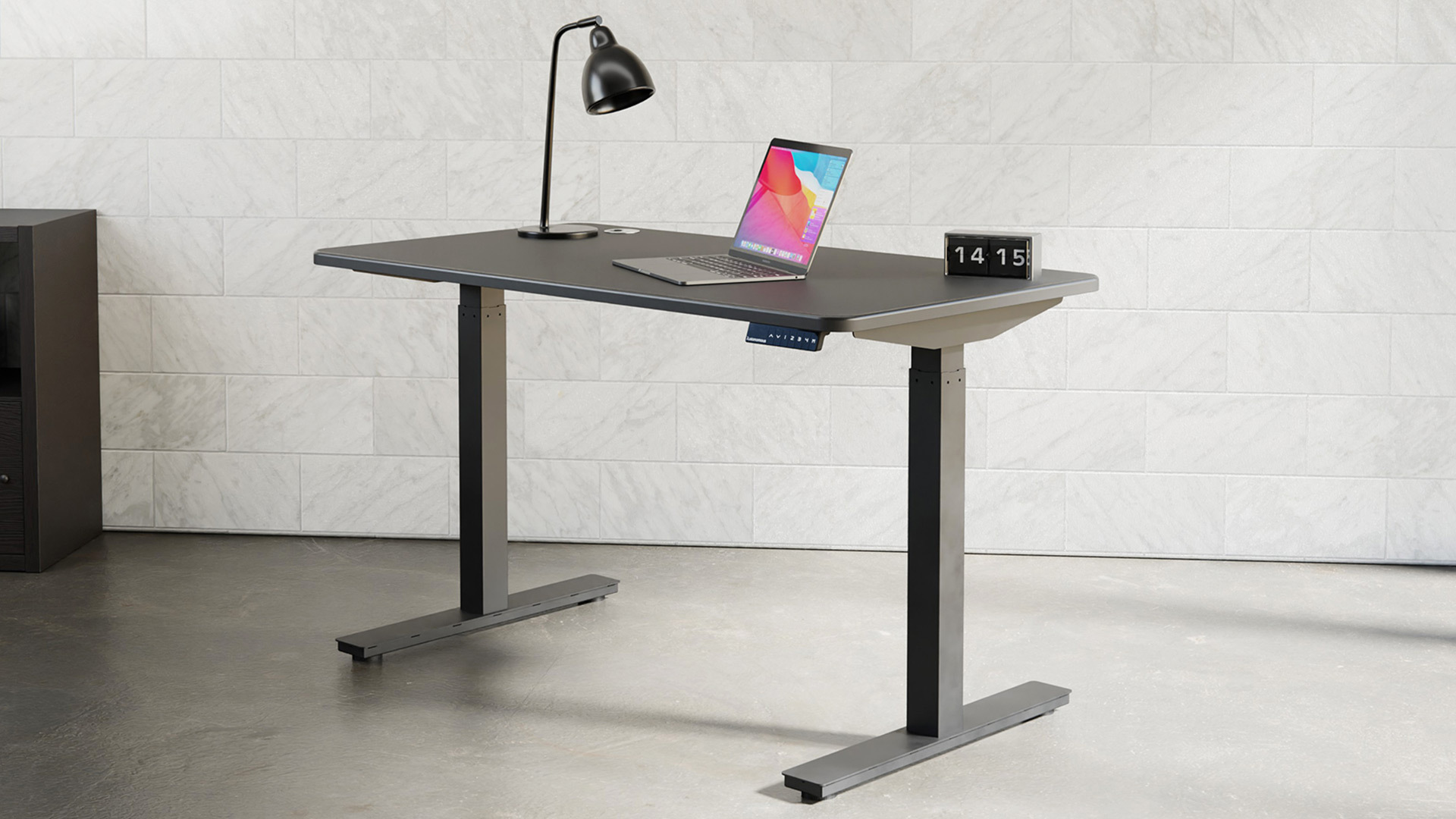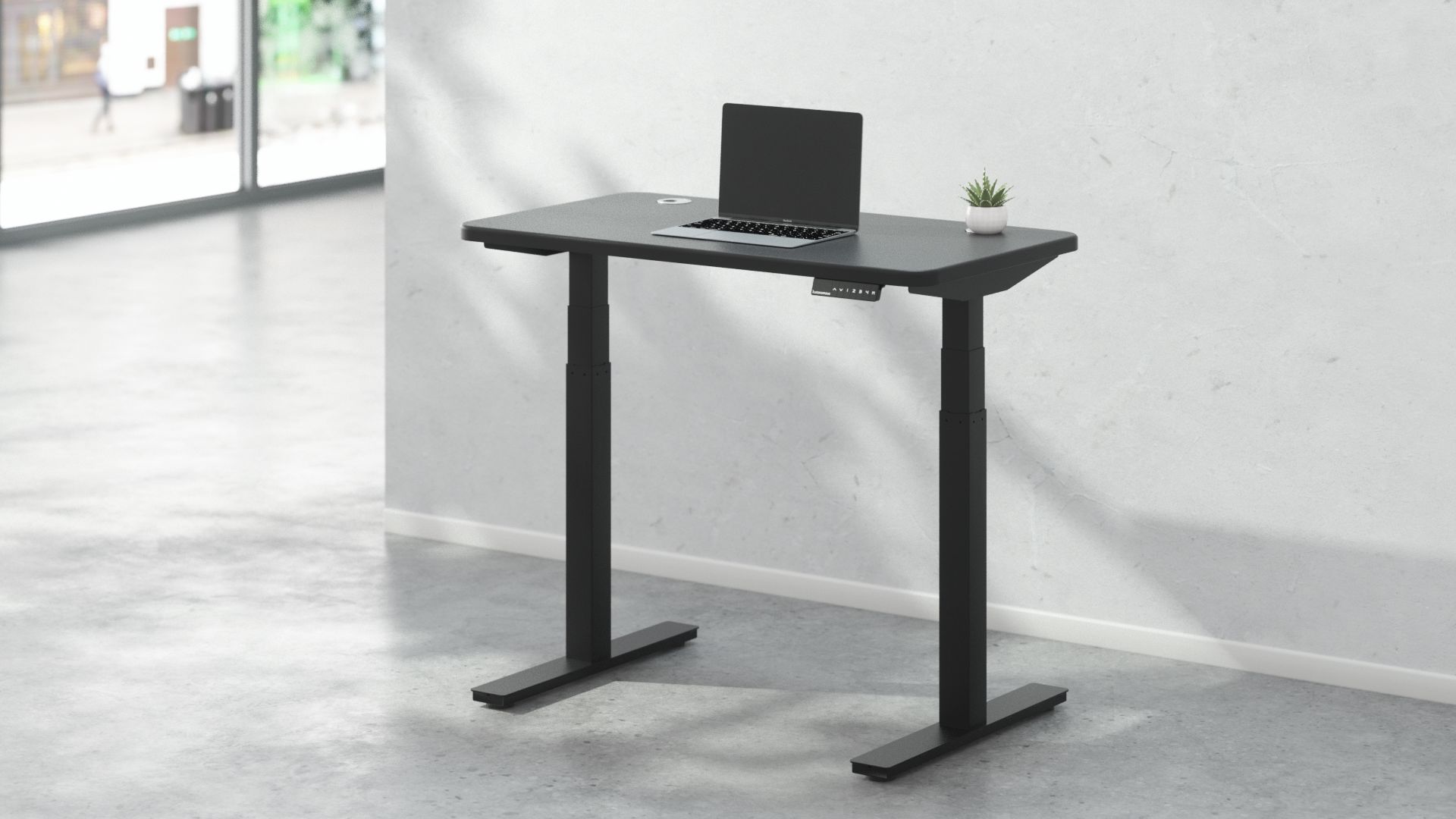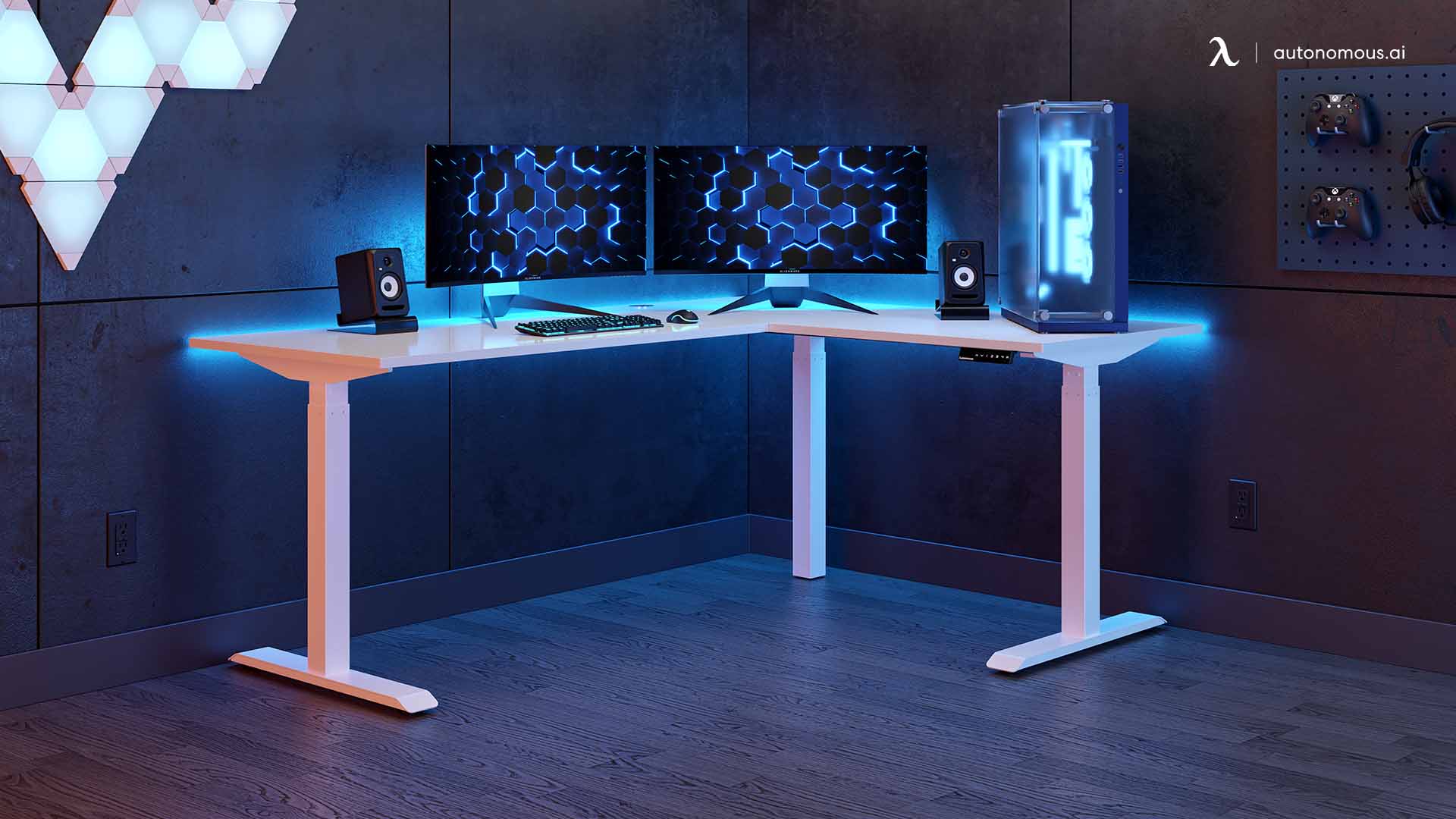
When choosing furniture for your workspace, the options seem endless. Among the myriad choices, solid wood desks have garnered a reputation for their timeless appeal and durability. However, before investing in a solid wood desk, it's okay to wonder whether it's genuinely worth it. In this article, we will explore the advantages and considerations of getting a solid wood desk, helping you decide whether it's the right choice for your needs.
What Is a Solid Wood Desk?
A solid wood desk is made entirely from solid wood material, unlike other types of desks that use wood veneers or composite materials. It is built using solid pieces of timber, typically from hardwood trees, such as oak, maple, cherry, or walnut.
The term "solid wood" means that the entire structure of the desk, including the top, sides, drawers, and legs, is crafted from solid wood without any other materials in the core or frame. This results in a desk that is sturdy, durable, and has a natural beauty and warmth that comes from the wood's unique grain patterns and characteristics.
Solid wood desks are often considered to be high-quality and long-lasting. They can be found in various styles, from traditional to contemporary, and offer a range of finishes and stains to enhance the natural beauty of the wood. Additionally, solid wood furniture can be sanded and refinished over time, allowing for repairs or changes in appearance if desired.
It's worth noting that solid wood executive desks may be more expensive compared to desks made with composite or veneer materials, as the cost of sourcing and crafting solid wood furniture can be higher. However, many people value solid wood desks' durability, aesthetic appeal, and timeless quality, making them a popular choice for home offices, study areas, and workspaces.
Are Solid Wood Desks More Expensive than Engineered Wood Ones?
Generally, solid wood desks tend to be more expensive than desks made from engineered wood. The cost difference is primarily due to the difference in materials and manufacturing processes involved.
Solid wood desks are made from solid pieces of timber, which are typically harvested from hardwood trees. The process of sourcing, cutting, and shaping solid wood requires more labor and expertise, as well as the use of higher-quality materials. Moreover, solid wood's natural beauty and durability also contribute to its higher price.
On the other hand, engineered wood desks are made from a combination of wood products and synthetic materials, such as plywood, particleboard, or medium-density fiberboard (MDF). These materials are often more affordable and easier to produce in bulk. Engineered wood is created by binding and compressing wood fibers or particles using adhesives and resins. The outer layer of the desk may have a wood veneer or laminate to give it the appearance of solid wood.
Although engineered wood desks can be cost-effective and offer decent durability, they could have a different level of longevity or aesthetic appeal than solid wood executive desks. Solid wood furniture can be sanded, repaired, and refinished over time, allowing for increased longevity and customization options.
It's essential to consider your budget, preferences, and intended use when choosing between a solid wood desk and an engineered wood desk. Solid wood desks are often seen as an investment due to their durability and timeless appeal, while engineered wood desks can provide a more budget-friendly option without sacrificing functionality.
How Do I Care for and Maintain a Solid Wood Desk?
Caring for and maintaining a solid wood executive desk can help preserve its beauty and prolong its lifespan. Here are some tips to keep in mind:
Dust Regularly
Use a soft, lint-free cloth or a microfiber duster to remove dust from the desk's surface. Regular dusting prevents dirt buildup and helps maintain the wood's natural shine.
Avoid Direct Sunlight
Prolonged exposure to direct sunlight can cause the wood to fade or develop uneven coloration. Place your wood standing desk away from windows or use curtains or blinds to protect it from direct sunlight.
Use Coasters and Mats
In order to prevent water rings, heat marks, and scratches, use coasters or placemats under hot or cold beverages, and use desk pads or mats under laptops, papers, or other items that may scratch the desktop.
Clean up Spills Immediately
Wipe up any spills or moisture promptly to prevent them from penetrating the wood and causing stains or warping. You can use a damp cloth to clean the affected area, then dry it thoroughly.
Avoid Harsh Cleaners and Chemicals
Harsh chemicals, abrasive cleaners, or solvents can damage the finish or strip away the natural oils in the wood. Stick to mild, wood-safe cleaners, or use a damp cloth for regular cleaning.
Apply Furniture Polish or Oil
Depending on the type of finish on your solid wood standing desk, you may want to periodically apply furniture polish or oil to nourish and protect the wood. Follow the manufacturer's instructions and choose a product suitable for your desk's finish.
Handle with Care
When moving objects on or off the small computer desk, lift them instead of sliding or dragging them to avoid scratching the surface. Use soft pads or felt protectors on the bottom of objects to prevent them from scratching the desk.
Consider Refinishing
Over time, the desk's surface can develop scratches or signs of wear. If desired, you can refinish the desk to restore its original appearance. However, we recommend consulting a professional or following appropriate DIY instructions for refinishing wood furniture.
Some Cons of Using Solid Wood Desks
Although solid wood desks offer numerous advantages, they also have a few potential drawbacks to consider. Here are some cons of using solid wood desks.
1. Cost
Solid wood writing desks are typically more expensive than engineered wood or other materials. The higher cost is primarily due to the quality of the material and the craftsmanship involved in creating solid wood furniture.
2. Weight
If you want to move your desk around, this will be a problem, as wood desks tend to be heavier than desks made from lighter materials. This can make them more challenging to move or reposition, particularly if you need to relocate or rearrange your workspace frequently.
3. Susceptible to Damage
Although solid wood is generally durable, it can be susceptible to scratches, dents, and water damage if you don't take proper care of it. Therefore, you must immediately clean up stains and spills. Also, you should take precautions to protect the surface from hot objects or sharp items.
4. Natural Variations
The natural variations in grain patterns, color, and texture that make solid wood standing desks aesthetically appealing can also be a drawback for some. Other materials such as engineered wood or laminates provide a smoother look if you prefer a more consistent and uniform appearance.
5. Environmental Impact
Solid wood desks require the harvesting of trees, which can raise concerns about deforestation and the depletion of natural resources. It's important to consider the sustainability practices of the wood industry and choose suppliers that adhere to responsible forestry management and certifications.
6. Maintenance
Solid wood desks require regular maintenance to keep them in good condition. This includes dusting, cleaning, and occasional refinishing or resealing, depending on the type of finish used. Therefore, you will have to make more maintenance efforts compared to desks made from other materials.
Despite these potential drawbacks, many still prefer solid wood stand-up desks for their timeless beauty, durability, and ability to be refinished and repaired over time. It ultimately comes down to personal preference, budget, and the specific needs of your workspace.
How Can Engineered Wood or MDF Wood Desks Address the Problems of a Solid Wood Desk?
Engineered wood desks, including those made from medium-density fiberboard (MDF) or other composite materials, can solve some of the challenges associated with solid wood desks. Here's how they can address specific problems:
1. Cost-effectiveness
Engineered wood desks are generally more affordable compared to solid wood standing desks. The manufacturing process of engineered wood allows for the efficient use of materials, making them a cost-effective option for those with budget constraints.
2. Weight and Portability
These desks are typically lighter in weight compared to solid wood desks. This makes them easier to move or reposition, which can be good if you frequently rearrange your workspace or if you plan to move the desk.
3. Durability and Resistance to Warping
Engineered wood, such as MDF, is designed to be more resistant to warping, cracking, and splitting than solid wood. Its composite nature and uniform structure help mitigate solid wood's natural variations and vulnerabilities.
4. Consistent Appearance
These desks can provide a more consistent and uniform appearance since they are manufactured rather than natural wood with grain patterns and color variations. This can appeal to those who prefer a more standardized and predictable look.
5. Environmental Considerations
Engineered wood desks can be a more environmentally friendly choice regarding resource utilization. They are often made from recycled wood fibers or byproducts, reducing the demand for virgin timber and minimizing waste.
6. Low Maintenance
Engineered wood desks typically require less maintenance compared to solid wood writing desks. They are less prone to moisture damage, stains, and scratches. Also, they rarely require refinishing or replacing over time. Regular cleaning and basic care are usually sufficient to make sure they last for a long time.
It's important to note that although engineered wood desks offer these advantages, they may not possess the same natural beauty, longevity, or ability to be refinished as solid wood desks. The choice between solid wood and engineered wood ultimately depends on your personal preferences, budget, and the specific requirements of your workspace.
Some Superior MDF Wood Desk Suggestions for You
1. Autonomous Desk 2 (Standard)
The Autonomous Desk 2 (Standard) is a versatile, feature-rich standing desk designed to elevate your work experience. With its sleek design, customizable options, and innovative features, this home standing desk aims to enhance productivity and support your well-being.
Our Autonomous Desk 2 (Standard) will impress you with its modern and minimalist design. The sturdy steel frame provides exceptional stability, ensuring wobble-free transitions between sitting and standing positions. Available in various sizes and finishes, it seamlessly fits into any workspace.

Autonomous Desk 2 (Standard)
| Top dimension | Small Top: 43"L x 24"W x 1"H Classic Top: 53"L x 29"W x 1"H XL Top: 70.5"L x 30"W x 1"H |
| Frame dimension | 27.5"W x 40" - 73"L |
| Height range | With top: 29.4" - 48" Without top: 28.4" - 47" |
| Materials | Top: Warp-proof, MDF wood, natural Bamboo Frame: SPCC steel |
| Colors | Top: White, Black, Walnut, White Oak, Bamboo Frame: White, Black, Grey |
| Weight capacity | 265 lbs |
| Warranty | 5 years for frame 1 year for top |
2. Autonomous Desk 2
The Autonomous Desk 2 is a powerful and reliable standing desk designed to optimize productivity in professional settings. With its robust construction, advanced features, and customizable options, it aims to create an ideal work environment for businesses.
Moreover, the Autonomous Desk 2 exudes professionalism with its sleek and contemporary design. It is built with commercial-grade materials and ensures long-lasting durability, making it a solid investment for busy office environments. The high-quality tabletop and sturdy steel frame guarantee stability, allowing you to work without worries.

Autonomous Desk 2
| Top dimension | Small Top: 43"L x 24"W x 1"H Classic Top: 53"L x 29"W x 1"H XL Top: 70.5"L x 30"W x 1"H |
| Frame dimension | 27.5"W x 40" - 73"L |
| Height range | With top: 29.4" - 48" Without top: 28.4" - 47" |
| Materials | Top: Warp-proof, MDF wood, natural Bamboo Frame: SPCC steel |
| Colors | Top: White, Black, Walnut, White Oak, Bamboo Frame: White, Black, Grey |
| Weight capacity | 265 lbs |
| Warranty | 5 years for frame 1 year for top |
3. Autonomous Desk 2 L-Shaped
Our Autonomous Desk 2 L-Shaped is a standout solution for those seeking a spacious and versatile workstation. It is designed to maximize productivity and adapt to various setups, but also offers ample surface area and a host of innovative features.
Boasting a sleek and contemporary design, the Autonomous Desk 2 L-Shaped adds a touch of elegance to any office or workspace. This L-shaped standing desk has a durable steel frame that ensures stability and longevity. Additionally, its high-quality tabletop, available in different finishes, provides a smooth and spacious work surface, accommodating multiple monitors, devices, etc.

Autonomous Desk 2 L-Shaped
| Top dimension | Full: 77”L x 64”W x 1”H Large Top: 77”L x 29”W x 1”H Small Top: 29”L x 35”W x 1”H |
| Frame dimension | 27.5”W x 42” - 71”L |
| Height range | With top: 29.4" - 48" Without top: 28.4" - 47" |
| Materials | Top: Warp-proof MDF wood Frame: SPCC steel |
| Colors | Top: White, Black Frame: White, Black |
| Weight capacity | 400 lbs |
| Warranty | 5 years for frame 1 year for top |
Bottom Line
In conclusion, deciding whether a solid wood writing desk is worth it depends on your priorities and preferences. Although they may come at a higher cost and require some maintenance, solid wood desks' inherent beauty, durability, and longevity make them a valuable investment for many. They bring a touch of elegance to any workspace, offer a connection to nature, and can withstand the test of time.
Also, remember there are several types of desks you can get no matter the material you choose. You can pick between double desks, hideaway desks, computer desks with a hutch, etc.
Ultimately, weigh the pros and cons, assess your budget and requirements, and choose a desk that aligns with your vision for an inspiring and functional workspace.
Spread the word
.svg)


.webp)
.webp)




